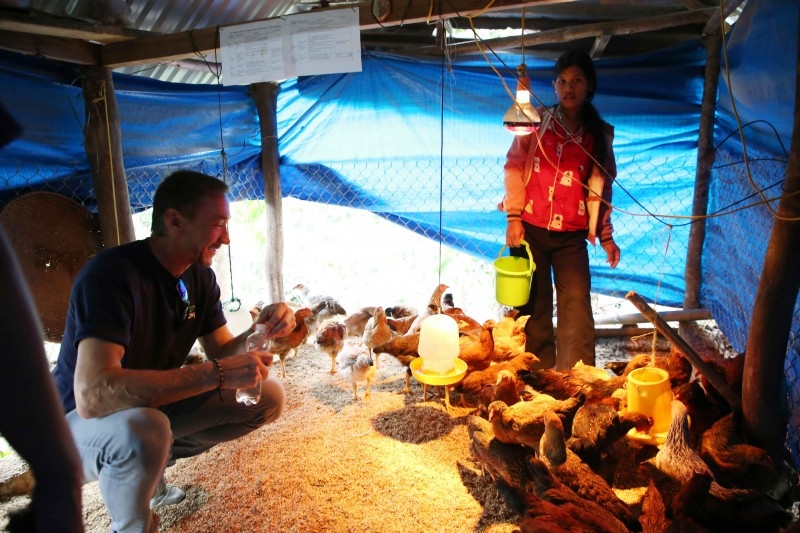International non-governmental organizations support poor households in Quang Ngai to improve livelihoods
Wednesday, 18/09/2024 15:36 (GMT+7)
Located 80 kilometers from Quang Ngai city, Son Tay district has a poverty rate exceeding 30%, significantly higher than the national average of 2.93%. In response to this situation, ADM and World Vision International in Vietnam (WVV) have partnered with the Son Tay District People's Committee to support local families with children.
 |
| Gerald Wilflingseder, President of ADM’s Animal Nutrition Division for Asia-Pacific, visits a household participating in the project. (Photo: TDO) |
Specifically, WVV has implemented the project "Sustainable Livelihood Support for Farming Households Through Circular Economy Approaches" in this area. After more than six months of implementation, the project has enhanced the livestock farming capacities of households, enabling them to improve their livelihoods independently. A total of 4,700 day-old chicks were distributed to 47 households, along with feed and materials for building shelters.
In addition, participating households attended training sessions aimed at improving livestock techniques, with guidance from ADM’s technical team. The project achieved three main objectives: improving livestock practices using bio-based bedding methods for disadvantaged families, enhancing their financial literacy, and establishing strong market connections for their products.
Prior to this project, ADM also collaborated with Quang Ngai on the "Sustainable Livelihoods for Farming Households" project in Nam Tra My district (Quang Nam) and Son Tay district (Quang Ngai) from December 2021 to July 2022. This earlier project directly benefited 130 farming households with children and indirectly helped improve household incomes, allowing better care for approximately 290 children.
Mr. Dinh Truong Giang, Vice Chairman of Son Tay District People’s Committee, stated that the households participating in the project in Son Tay have been introduced to new livestock farming methods that have increased productivity, improved product quality, and reduced negative environmental impacts. “Additionally, the mindset of individuals and households has changed,” he added. “Developing family economies through sustainable agricultural production has gradually taken root, which is a crucial step.”
At the project's closing ceremony on September 17, WVV’s Chief Representative Doseba Tua Sinay shared that WVV is always committed to improving the well-being of children, especially the most vulnerable. “Through this project, we focused on supporting households with children in difficult economic conditions. In the future, WVV will continue to seek opportunities to expand and replicate this model, not only in Son Tay, but also in other regions. We hope to contribute to improving the lives of even more families,” he said./.
Compiled by BTA